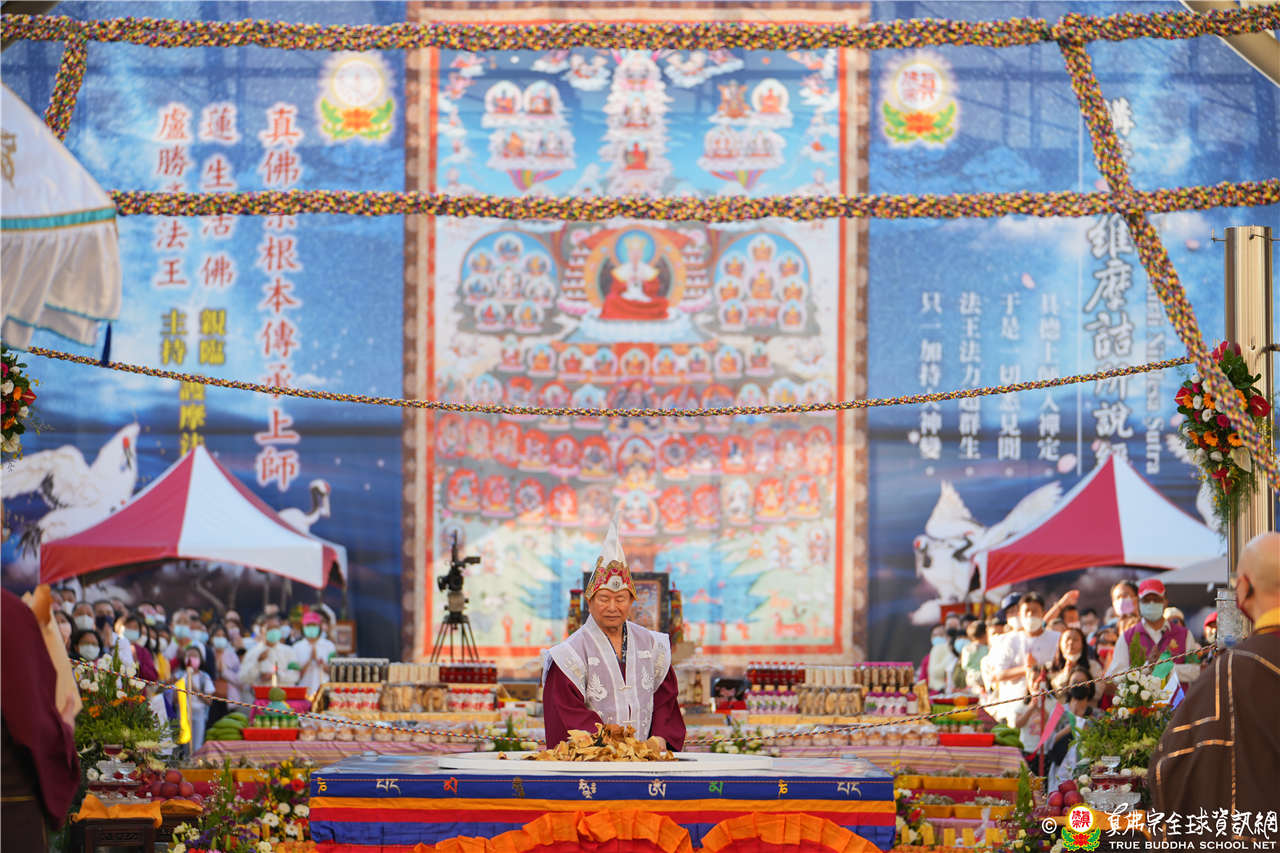
Vimalakirti Nirdesa Sutra
A Detailed Exposition by Living Buddha Lian Sheng, Grandmaster Sheng-Yen Lu
Translated into English by the True Buddha School Vimala Sutra Translation Team
Discourse 53, 10 December 2022 - Chapter One—Buddhaverse (Continued)
Chapter One—Buddhaverse
Also, there were tens of thousands of Mahabrahma Sikhin and other devas from the rest of the Four Heavens descending to the Buddha’s place to listen to the dharma. In the assembly, there were also twelve thousand celestial kings, the mighty heavenly beings, dragon gods, yaksas, gandharvas, asuras, garudas, kinnaras, maharagas, as well as all the bhiksus, bhiksunis, upasakas, and upasikas.
…as well as all the bhiksus, bhiksunis, upasakas, and upasikas.
Of course, in attendance were all the Mahabrahman devas, the heavenly beings and their kings, dragons, yaksas, gandharvas, asuras, garudas, kinnaras, maharagas, and more. I have explained earlier that maharagas are gods with a serpentine body. Some disciples have asked me about the earthly dragons; the earthly dragons are maharagas.
Who else attended? The bhiksunis, bhiksus, upasakas, and upasikas.The easy explanation would be: bhiksus are Buddhist monks, and bhiksunis are nuns. Buddhist lay practitioners who take refuge in the Three Jewels and abide by the five precepts are called upasakas for males and upasikas for females. But that’s not it!
What does bhiksu mean? The Sanskrit word bhiksu [or bhiksu in Pali] means beggar. We sometimes refer to the bhiksus and bhiksunis as the alms beggars. They beg for two things: for buddhadharma high above and for food and clothing below. They beg for dharma treasures—buddhadharma—from Sakyamuni Buddha. And they beg for food and clothing from the people.
The original meaning of bhiksu is beggar. Once you are ordained, you are called a bhiksu or bhiksuni, and you become a beggar—for buddhadharma above and food and clothing below. But as an ordained monastic, if you receive offerings from sentient beings, yet do not have any buddhadharma to give back, then you are not a bhiksu or bhiksuni.
Everything that Grandmaster has—clothing, food, bags, etc. were given by other people. They give me lama robes and dragon vests, and also food. Like tonight, I will eat at the Taiwan Lei Tsang Temple. See? Many people made meal offerings—TWD 100,000 here and there. That’s begging for clothing and food below. However, if you do not know any buddhadharma, then you are not a real bhiksu or bhiksuni. That’s why, let me tell you, it is not easy to become a bhiksu or bhiksuni. You must be well-versed in buddhadharma to be qualified to become a bhiksu or bhiksuni. If you only accept offerings from sentient beings but do not possess nor understand any buddhadharma, then you are not qualified to become a bhiksu or bhiksuni. You must master all kinds of buddhadharma; once you do, you are an acarya. If you do not, you are not an acarya nor a bhiksu/bhiksuni. Hence, you need to understand buddhadharma to be called a bhiksu or bhiksuni.
Therefore, the terms bhiksu and bhiksuni are very difficult to explain. Generally, most people do not get into the real meaning and just say that bhiksus and bhiksunis are those who are ordained and make the ordination vow. However, it’s not that simple!
Listen carefully. A bhiksu or bhiksuni begs for buddhadharma above and food and clothing below. Now, do you understand? Upasakas and upasikas are the male and female lay Buddhists who take refuge in the Three Jewels and abide by the five precepts. They all came to attend the grand ceremony of Sakyamuni Buddha.
That’s all for today.
Om mani padme hum.
Next discourse on the Vimalakirti Sutra: Discourse 54, 17 December 2022 - Chapter One—Buddhaverse (Continued)
Previous discourse on the Vimalakirti Sutra: Discourse 52, 3 December 2022 - Chapter One—Buddhaverse (Continued)
Index of links to all discourse on the Vimalakirti Sutra: https://en.tbsn.org/guidem/detail/2975/
Back to the main index page of all dharma discourse: https://en.tbsn.org/guidem/index
Full webcast of 2022.12.10 Padmakumara Homa Ceremony (Taiwan Lei Tsang Temple) and dharma discourse with English interpretation: https://youtu.be/yoNuWspbIlQ



